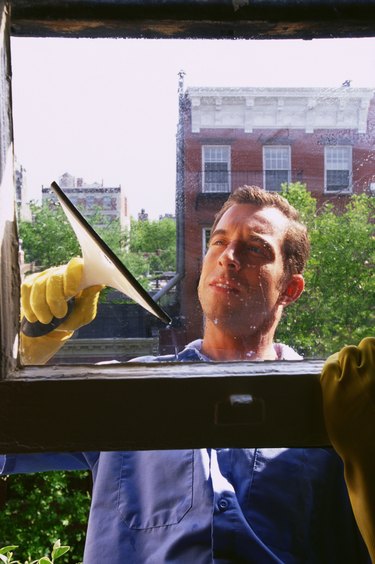
Vinegar is an effective window and glass cleaner because its natural acids cut through hard-water buildup. This is especially helpful for sliding glass doors that are exposed to sprinkler water. Hard water has a high concentration of minerals, such as calcium and magnesium. Hard water deposits minerals on glass, and those deposits remain there after the water has evaporated. For windows, this means water spots and cloudy stains.
Waxy Buildup
Video of the Day
Commercial window cleaners can leave a waxy residue on glass. If you intend to use plain distilled vinegar as your window cleaner, clean the windows first with a soap and vinegar solution. In a spray bottle, mix 2 cups of water, a half cup of white distilled vinegar and 1/2 teaspoon of liquid dish soap. Spray the solution on the windows, and let it set for about 30 seconds before buffing with a soft cloth. No rinsing is needed.
Video of the Day
Vinegar and Soap
For heavy cleaning, fill a bucket with 4 cups of water. Add a half cup of white distilled vinegar and 1 teaspoon of liquid dish soap. To use, soak a lint-free cloth in the solution, and squeeze out excess liquid before wiping down the window. Instead of wiping the window with a wet cloth, sponge the mixture liberally over the window and scrub, moving the sponge in a circular motion. Remove the solution by running a squeegee down the glass pane.
Soap Substitute Recipe
For a spray window cleaner, use ammonia instead of dish soap. Ammonia is a common ingredient in commercial window cleaners. Add to a spray bottle 2 cups of water, 2 tablespoons of white distilled vinegar and 4 tablespoons of ammonia. Shake well.
Vinegar and Water
It is possible to make window cleaner with just vinegar and water. To a spray bottle, add 2 cups of water and 1 tablespoon of vinegar. Some people add several drops of blue food coloring, to make the homemade cleaner look like a commercial product. The coloring serves no purpose other than to change the appearance of the cleaner.
Fast Drying
For a fast-drying and nonstreaking window cleaner, use vinegar and rubbing alcohol. Fill a spray bottle with 1 cup of water, 1 cup of rubbing alcohol and just 1 tablespoon of white distilled vinegar. This is appropriate when you need a nonstreaking window cleaner.
No Water, No Soap
Instead of mixing the vinegar with soap, water, rubbing alcohol or ammonia, use straight vinegar, or dilute the vinegar with an equal amount of water. Straight vinegar is an effective cleaner for removing tough hard-water stains.